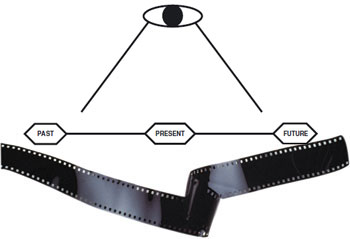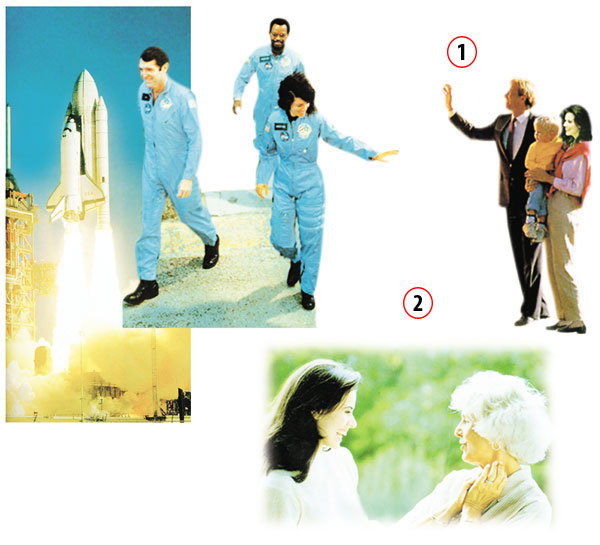The Fact of Timelessness
 |
With what we have already described, the fact we never have direct experience of the original of a "3-dimensional space" and that we spend all our lives in a space in our minds becomes crystal clear. Asserting the contrary would be to profess a superstitious belief removed from reason and scientific truth, for it is not possible to have direct contact with the original of the external world.
This refutes the primary assumption of the materialist philosophy underlying evolutionary theory—the assumption that matter is absolute and eternal. The materialistic philosophy's second assumption is that time is also absolute and eternal—a supposition just as superstitious as the first.
The Perception of Time
What we call "time" is in fact a method by which one moment is compared to another. For example, when a person taps an object, he hears a particular sound. If he taps the same object again, he hears another sound. Thinking there is an interval between the two sounds, he calls this interval "time." Yet when he hears the second sound, the first one he heard is no more than a memory in his mind, merely a bit of information in his imagination. A person formulates his perception of time by comparing the moment in which he lives with what he holds in memory. If he doesn't make this comparison, he can have no perception of time either.
Similarly, a person makes a comparison when he sees someone enter through a door and sit in an armchair in the middle of the room. By the time this person sits in the armchair, the images of the moment he opened the door and made his way to the armchair are compiled as bits of information in memory. The perception of time takes place when one compares the man sitting on the armchair with those bits of recalled information.
Briefly, time comes about as a result of comparisons of information stored in the brain. If man had no memory, his brain could not make such interpretations and therefore, he would never form any perception of time. One determines himself to be thirty years old, only because he has accumulated in his mind information pertaining to those thirty years. If his memory did not exist, then he could not think of any such preceding period and would be experiencing only the single "moment" in which he was living. And this point is very important.
The Scientific Explanation of Timelessness
We can clarify this subject by quoting various scientists' and scholars' explanations. Regarding the idea of time flowing backwards, François Jacob, a famous intellectual and Nobel laureate professor of genetics, states the following in his book Le Jeu des Possibles (The Play of Possibilities):
Films played backwards let us imagine a world in which time flows backwards. A world in which cream separates itself from the coffee and jumps out of the cup to reach the creamer; in which the walls emit light rays that are collected in a light source instead of radiating out from it; a world in which a stone leaps up to a man's hand from the water where it was thrown by the astonishing cooperation of innumerable drops of water surging together. Yet, in such a time-reversed world with such opposite features, our brain processes, and the way our memory compiles information, would similarly function backwards. The same is true for the past and future, though the world will appear to us exactly as it does currently.11
 |
All events that seem to have taken place in the past, or which will take place in the future, or are taking place in the present, have actually already taken place and ended in the Sight of Allah, Who is not bound by time or place. In the same manner, eternity has also been experienced and ended in the Sight of Allah. Just like the concurrent existence of the shots in a reel of film. |
But since our brain is accustomed to a certain sequence of events, the world does not operate as related above. We assume that time always flows forward. However, this is a decision reached in the brain and is, therefore, completely relative. If the information in our memories were set out like a reel of film being played backward, then for us the passage of time would be like it is in films. In that event, we would start perceiving the past as the future, and the future as the past, and living in a state that is the exact opposite of what life is now.
And in reality, we never can know how time flows—or even whether it flows or not! This is because time is not an absolute fact, but only a form of perception.
That time is a perception is also verified by Albert Einstein in his Theory of General Relativity. In his book The Universe and Dr. Einstein, Lincoln Barnett writes:
Along with absolute space, Einstein discarded the concept of absolute time—of a steady, unvarying inexorable universal time flow, streaming from the infinite past to the infinite future. Much of the obscurity that has surrounded the Theory of Relativity stems from man's reluctance to recognize that sense of time, like sense of color, is a form of perception. Just as space is simply a possible order of material objects, so time is simply a possible order of events. The subjectivity of time is best explained in Einstein's own words. "The experiences of an individual," he says, "appear to us arranged in a series of events; in this series the single events which we remember appear to be ordered according to the criterion of 'earlier' and 'later'. There exists, therefore, for the individual, an I-time, or subjective time. This in itself is not measurable. I can, indeed, associate numbers with the events, in such a way that a greater number is associated with the later event than with an earlier one.12
These words of Einstein's show how we are completely conditioned to think that time flows forward.
As Barnett wrote, Einstein showed that, "space and time are forms of intuition, which can no more be divorced from consciousness than can our concepts of color, shape, or size."13 According to the Theory of General Relativity: "time has no independent existence apart from the order of events by which we measure it."
Since time consists of perception, it depends entirely on the perceiver—and is therefore relative.
The speed at which time flows differs according to the references we use to measure it, because the human body has no natural clock to indicate precisely how fast time passes. As Barnett wrote, "Just as there is no such thing as color without an eye to discern it, so an instant or an hour or a day is nothing without an event to mark it."14
In a World Where Time Flew Backwards, Past Would Be Future
 |
Because every event is shown to us in a definite series, we think that time always moves forward. For example, a skier always skies down a mountain, not up it. A drop of water does not rise up from a pool, but always falls down into it. In this situation, a skier's position on a mountain is in the past, while his position down the mountain is the future. However, if the information in our memories were to be displayed in reverse, as we would rewind a film, what is for us the future, that is the downhill position, would be the past and the past, that is the uphill position, would be the future.
 |
The relativity of time is plainly experienced in dreams. Although what we perceive in a dream seems to last for hours, in fact, it only lasts for a few minutes, and often even a few seconds.
An example will clarify the point. Assume that you were put into a room with a single window, specifically designed; and were kept there for a certain period of time. A clock on the walls shows you the amount of time that has passed. During this "time," from the room's window, you see the sun setting and rising at certain intervals. A few days later, questioned about the amount of time spent in the room, you would give an answer based on the information you had collected by looking at the clock from time to time, as well as by counting how many times the sun had set and risen. Say, for example, you estimate you'd spent three days in the room. However, if the person who put you in there says that you spent only two days in there; that the sun you saw from the window was falsely produced; and that the clock in the room was especially regulated to move faster, then your calculation would be erroneous.
This example dramatizes that the information we have about the rate of time's passing is based only on references that change according to the perceiver.
In the same way, the way that the speed of the passage of time is perceived differently be everyone depending on the circumstances proves that time consists of a psychological perception. For example, a 10-minute delay while waiting to meet a friend may seem a very long time to you. Or an extra 10 minutes sleep may seem very long to someone waking to go to school or work after a sleepless night, and he may actually imagine he has had a full night's sleep because of it. Under some circumstances, the opposite may apply. As you will remember from your student days, a 10-minute break after a lesson lasting 40 minutes, or seeming to last a century, may go by very quickly.
That relativity of time is a scientific fact, also proven by scientific methodology. Einstein's Theory of General Relativity shows that the speed of time changes depending on the speed of the object and its distance from the center of gravity. As speed increases, time is shortened—compressed—and slows down until it approaches to the point of stopping entirely.
Einstein himself gave an example. Imagine two twins, one of whom remains on Earth while the other goes into space at a speed close to the speed of light. On his return, the traveler will find that his brother has grown much older than he has. The reason is that time flows much more slowly for the person who travels at near-light speed. The same example may be used for a father travelling into space on a rocket at 99% of the speed of light, and his son who remains on Earth.
If the father were 27 years old when he set out, and his son was only three, the father, when he comes back 30 years later in Earth time, will be only 30, whereas his son will be 33 years old!
 | |
1- 30 years ago | 2- Today |
One twin sister takes a space trip at a speed close to the speed of light. When she returns thirty years later, the sister who stayed on the Earth will be much older compared to the sister who went into space. | |
This relativity of time is caused not by clocks slowing down or running fast. Rather, it's the result of the differentiated operational periods of the entire material system, as deep as sub-atomic particles. In such a setting where time stretches out, one's heartbeat, cell replications, and brain functions all operate more slowly. Thus, the person continues with his daily life and does not notice the slowing of time at all.
These facts revealed with the theory of relativity were subsequently confirmed many times over by a great many scientists. Isaac Asimov said this about the theory:
In his book Frontiers, Isaac Asimov also states that it is 84 years since the publication of Einstein's Theory of Relativity, and each time the theory has been tested, Einstein has been proved right once again.16
Relativity in the Qur'an
The conclusion to which we are led by the findings of modern science is that time is not an absolute fact as supposed by materialists, but only a relative perception. The important fact on this matter, undiscovered until the 20th century by science, was imparted to mankind in the Qur'an 14 centuries ago. There are various references in the Qur'an to the relativity of time.
It is possible to see the scientifically-proven fact that time is a psychological perception dependent on events, setting, and conditions in many verses of the Qur'an. For instance, the entire life of a person is a very short time as we are informed in the Qur'an:
On the Day He calls you, you will respond by praising Him and think that you have only tarried a very short time. (Surat al-Isra': 52)
On the day We gather them together – when it will seem if they had tarried no more than an hour of a single day – they will recognize one another…(Surah Yunus: 45)
Some verses reveal that time passes faster than people imagine.
He will say, 'How many years did you tarry on the earth?' They will say, 'We tarried there for a day or part of a day. Ask those able to count!' He will say, 'You only tarried there for a little while if you did but know! (Surat al-Muminun: 112-114)
In some other verses it is stated that time may flow at different paces in different settings:
They ask you to hasten the punishment. Allah will not break His promise. A day with your Lord is equivalent to a thousand years in the way you count.. (Surat al-Hajj: 47)
The angels and the Spirit ascend to Him in a day whose length is fifty thousand years. (Surat al-Ma'arij: 4)
He directs the whole affair from heaven to earth. Then it will again ascend to Him on a day whose length is a thousand years by the way you measure. (Surat as-Sajda: 5)
These verses are all manifest expressions of the relativity of time. The fact that this result only recently understood by science in the 20th century was communicated to man 1,400 years ago in the Qur'an is, of course, one of the indications that the Qur'an is a revelation of Allah, Who encompasses all of time and space.
 |
Time is a concept totally dependent on the perceiver. A certain period of time can seem long to one person while it seems very short to another. To understand who is right, various devices such as a clock or a calendar are needed. Without these, it is impossible to make a precise reckoning about time. |
The narration in many other verses of the Qur'an reveals that time is a perception. This is particularly evident in the stories. For instance, Allah has kept the Companions of the Cave, a believing group mentioned in the Qur'an, in a deep sleep for more than three centuries. When they were awoken, these people thought that they had stayed in that state but a little while, and could not figure out how long they slept:
So We sealed their ears with sleep in the cave for a number of years. Then We woke them up again so that we might see which of the two groups would better calculate the time they had stayed there.(Surat al-Kahf: 11-12)
That was the situation when we woke them up so they could question one another. One of them asked, 'How long have you been here?' They replied, 'We have been here for a day or part of a day.' They said, 'Your Lord knows best how long you have been here...." (Surat al-Kahf: 19)
The situation told in the below verse is also evidence that time is in truth a psychological perception.
Or the one who passed by a town which had fallen into ruin? He asked, 'How can Allah restore this to life when it has died?' Allah caused him to die a hundred years then brought him back to life. Then He asked, 'How long have you been here?' He replied, 'I have been here a day or part of a day.' He said, 'Not so! You have been here a hundred years. Look at your food and drink – it has not gone bad – and look at your donkey so We can make you a Sign for all mankind. Look at the bones – how We raise them up and clothe them in flesh.' When it had become clear to him, he said, 'Now I know that Allah has power over all things.' (Surat al-Baqara: 259)
It is clearly stated in the above verse that Allah, Who created time, is unbound by it. Man, on the other hand, is bound by time that Allah ordains. As in the verse, man is even incapable of knowing how long he stayed in his sleep. In such a state, to assert that time is absolute [just like the materialists do in their distorted mentality], would be very unreasonable.
Destiny
Time's variable relativity reveals a very important reality: A period of time of apparently billions of years' duration to us, may last only a second in another dimension. Moreover, an enormous period of time—from the world's beginning to its end—may not last even a second, but just an instant in another dimension.
This is the very essence of destiny's reality—one that is not well understood by most people, especially materialists, who deny it completely. Destiny is Allah's perfect knowledge of all events, past or future. Many, if not most, question how Allah can already know events that have not yet been experienced, and this leads them to fail to understand the authenticity of destiny. However, events not yet experienced are not yet experienced by us only. Allah is not bound by time or space, for He Himself has created them. For this reason, the past, the future, and the present are all the same to Allah; for Him, everything has already taken place and is finished.
In The Universe and Dr. Einstein, Lincoln Barnett explains how the Theory of General Relativity leads to this insight. According to him, the universe can be "encompassed in its entire majesty only by a cosmic intellect." What Barnett calls "the cosmic intellect" is the wisdom and knowledge of Allah, Who prevails over the entire universe. Just as we easily see the beginning, middle, and end of a ruler and all the units in between as a whole, so Allah knows the time to which we're subjected right from its beginning to the end, like a single moment. People experience incidents only when their time comes for them to witness the fate Allah has created for them.
 |
Every existing thing is created with a destiny. Even before a vase is manufactured, it is determined in Allah's Sight who will make it and in what style, who will buy it and from where, in what house and in what corner it will be placed, and on what day, in what moment and why it will fall and be broken. |
At this point the false nature of the idea of destiny espoused by some people needs to be clarified. This distorted understanding of destiny presents the superstitious belief that Allah has determined a "destiny" for every man, but sometimes that people can change these destinies. For instance, speaking of a patient who's recovered from a fatal disease, people make superficial statements like, "He defeated his destiny." Yet no one is able to change his destiny. The person who recovers is destined not to die then. Again, it's the destiny of those people to deceive themselves by saying, "I defeated my destiny" and maintain such a mindset.
In the verse "... no living thing lives long or has its life cut short without that being in a Book. That is easy for Allah."(Surah Fatir: 11), it is revealed that all these things are ordained in destiny. Because destiny is the eternal knowledge of Allah. And for Allah, Who knows the whole time as a single moment and Who prevails over the whole time and space, everything is determined and finished in its destiny.
We also understand from what is related in the Qur'an that time is one for Allah: some incidents that appear to happen to us in the future are related in the Qur'an in such a way that they already took place long before. For instance, the verses that describe the account that people are to give to Allah in the Hereafter are related as events, which already occurred long ago:
The Trumpet will be blown and those in the heavens and those in the earth will all lose consciousness,except those Allah wills.Then it will be blown a second time and at once they will be standing upright, looking on. And the earth will shine with the Pure Light of its Lord; the Book will be put in place; the Prophets and witnesses will be brought; it will be decided between them with the truth... (Surat az-Zumar, 68-69)
Those who disbelieve will be driven to Hell in companies... (Surat az-Zumar, 71)
And those who fear [and respect] their Lord will be driven to the Garden in companies ... (Surat az-Zumar, 73)
Some other verses on this subject are:
Every self come together with a driver and a witness. (Surah Qaf: 21)
And Heaven will be split apart, for that Day it will be very frail.. (Surat al-Haqqa: 16)
And will reward them for their steadfastness with a Garden and with silk. Reclining in it on couches, they will experience there neither burning sun nor bitter cold. (Surat al-Insan: 12-13)
And the Blazing Fire will be displayed for all who can see.. (Surat an-Nazi'at: 36)
So today those who believe are laughing at the kuffar. (Surat al-Mutaffifin: 34)
The evildoers will see the Fire and realize they are going to fall into it and find no way of escaping from it... (Surat al-Kahf: 53)
As may be seen, occurrences that are going to take place after our death (from our point of view) are related as already experienced and past events in the Qur'an. Allah is beyond the relative time frame that we are confined in. Allah has willed these things in timelessness: people have already performed them and all these events have been lived through and ended. It is imparted in the verse below that every event, be it big or small, is within the knowledge of Allah and recorded in a book:
You do not engage in any matter or recite any of the Qur'an or do any action without Our witnessing you while you are occupied with it. Not even the smallest speck eludes your Lord, either on earth or in heaven. Nor is there anything smaller than that, or larger, which is not in a Clear Book. (Surah Yunus: 61)
The Worry of the Materialists
The facts discussed in this chapter, namely the truth underlying matter, timelessness, and spacelessness, are extremely clear indeed. As expressed earlier, these are not some sort of philosophy or way of thinking, but crystal-clear scientific truths, impossible to deny. On this issue, rational and logical evidence admits no other alternatives: The universe—with all the matter composing it and all the people living on it—is an image, a collection of perceptions that are experienced in our minds and whose original reality we cannot contact directly.
Materialists have a hard time in understanding this.
One main reason why materialists cannot comprehend this is their subliminal fear of the implication they must face if they comprehend it. Lincoln Barnett tells of the fear and anxiety that even "discerning" this subject inspires in materialist scientists:
Along with philosophers' reduction of all objective reality to a shadow-world of perceptions, scientists became aware of the alarming limitations of man's senses.17
Any reference to the fact that we cannot make contact with original matter, and that time is a perception, arouses great fear in a materialist because these are the only notions he relies on as absolutes. In a sense, he takes these as idols to worship; because he believes in the deception that he has been created by matter and time, through evolution. (Allah is beyond this.)
When he feels that he cannot get to the essence of the universe he lives in, nor the world, his own body, other people, other materialist philosophers whose ideas he is influenced by—in short, to anything—he feels overwhelmed by the horror of it all. Everything he depends on and believes in suddenly vanishes. He feels the despair which he, essentially, will experience on the Day of Judgment in its real sense as informed in the verse"On that Day they will offer their submission to Allah and the things they invented will abandon them."(Surat an-Nahl: 87)
From then on, this materialist tries to convince himself that he's really confronting external, original matter, and makes up "evidence." He hits his fist on the wall, kicks stones, shouts, and yells. But he can never escape from the reality.
Just as materialists want to dismiss this reality from their minds, they also want other people to discard it. They realize that if the true nature of matter becomes known to people in general, the primitiveness of their own philosophy and the ignorance of their worldview will be laid bare for all to see. No ground will be left on which they can rationalize their views. These fears explain why they are so disturbed by the facts related here.
Allah states that the fears of the unbelievers will be intensified in the Hereafter. On the Day of Judgment, they will be addressed thus:
On the Day We gather them all together, We will say to those who associated others with Allah, 'Where are the partner-gods, for whom you made such claims?' (Surat al-An'am: 22)
In the Hereafter, unbelievers will bear witness to their possessions, children and close friends leaving them and vanishing. They had assumed themselves to be in contact with their originals in the world and associated them with Allah. Allah stated this fact in the verse "See how they lie against themselves and how what they invented has forsaken them!" (Surat al-An'am: 24)
The Gain of Believers
The facts—that matter is not absolute and that time is a perception—alarm materialists, but for true believers, just the opposite holds true. People with faith in Allah feel gladness to have perceived the secret behind matter, because this reality is the key to every question. With this, all secrets are unlocked, and one can easily understand many issues that normally seemed hard to grasp.
As said before, the issues of death, Paradise, Hell, the Hereafter, and changing dimensions, eternity will thus be comprehended. Important questions such as, "Where is Allah?," "What existed before Allah?," "Who created Allah?," "How long will the life in cemetery last?," "Where are Paradise and Hell?," and "Do Paradise and Hell currently exist?" will be easily answered. Once it's understood that Allah created the entire universe from nothingness, the questions of "When?," and "Where?" become meaningless, because there will be no time or place left. When spacelessness is comprehended, it can be understood that Hell, Paradise and Earth are all actually in the same location. If timelessness is understood, it will be understood that everything takes place at one single moment: Nothing need be awaited, and time does not go by, because everything has already happened and finished. In other words, eternity has already begun.
When this secret is comprehended, the world becomes like Paradise for any believer. All distressful material worries, anxieties, and fears vanish. The person grasps that the entire universe has one single Sovereign, that He creates the entire physical world as He pleases, and that all one has to do is to turn unto Him. He then submits himself entirely to Allah "to be devoted to His service." (Surah Al 'Imran: 35)
Grasping this secret is the greatest gain in the world.
Mr. Adnan Oktar's Remarks On Destiny,
Preordination and The Fact That Allah is Everywhere

Adnan Oktar: The subjects on which people concentrate most are those such as the existence of Allah, death, what will happen in the Hereafter, and destiny. In other words, no matter how much they try not to let on, this is the subject that occupies their brains day and night. That is because every night, there is a film on the TV about someone dying. Even if a person sees a dead insect, it would remind him of death, and when he thinks about himself it reminds him of death again.
People are very troubled when it comes to destiny. There are still objections raised, even though I have talked about it at such length, they are still saying things. They say that Allah has created destiny, of course. There is predestination, but there is also partial free will, they say, in other words a very small power unique to us that Allah—may Allah forbid—cannot control, which belongs to us. In other words, Allah does not know what we will do, or He knows, but only vaguely (Surely Allah is beyond that). And when we do something Allah shows us two paths, but cannot know which we will go down. We choose that path with our own free will (Surely Allah is beyond that). And that comes up as a surprise information, may Allah forbid, for Allah. That is to say something emerges that He encounters for the first time, and Allah thus tests us, and He understands accordingly (Surely Allah is beyond that). There is no such thing at all. Both preordination and partial free will are created by Allah Himself.
Look, there exists just one single moment. What does a single moment in time mean? It means an infinitely short space of time. What we call "an instant" is an infinitely short time. Allah has created and completed infinite before and an infinite after within that infinitely brief moment. There is nothing to be done. There is nothing one can do. So how is that partial free will of yours not part of destiny? Consequently, such egocentric people who regard themselves—may Allah forbid—as divine, cannot get over this point one way or another. The fact that Allah has created preordination and also partial free will disturb them for some reason. The second thing that disturbs them is the fact that Allah is everywhere. They want Allah to be up in the sky. They want Him to be in one specific point in the sky. Not everywhere in the sky, just in one specific location there. That means, relative to infinity that makes it a place that can count for nothing. That is because compared to infinity, no matter how large something in a given place is, anything covering a given volume—may Allah forbid, we do not carry such a belief—is still infinitely small. Isn't it? It is infinitely small. It exists but is very small.
Someone wrote recently saying that if Allah is in our room, and everywhere in our bodies, then we must ourselves be Allah, may Allah forbid! We worship the Essence of Allah. Being a Manifestation of Allah is one thing, the Essence of Allah is different, isn't it? We worship the Essence of Allah. Of course we are Manifestations of Allah and Allah exists everywhere. He is also in our bodies. Some people do not want Allah to be in their bodies. And they do not therefore want Him to be in the room, either. Where do they want Him? Up in the sky and far, far away. They want Him to be there, quadrillions of kilometers away, may Allah forbid!
Why do they say it has to be like this, why do they believe in this, I really don't understand. It means that when such people are asked if Allah is here, they would say He is not. Where is Allah? Up in the sky, but Allah is not here, they would say. Consequently, they would say Allah is not on earth (may Allah forbid), right? They would say Allah is up in the skies but He is not here. They say only His knowledge can reach us, but not Him. They say: "we are the absolute beings, Allah is but a shadow".

I used to hear that in my childhood. Prove that Allah exists, they used to say. And then they would say; "Can you show a TV image, or a radio sound, or your own mind? Can you show us the inside of your mind?" Then they used to say since you can't show your own mind, you can't show Allah, either, that was their explanation. It is true that Allah cannot be seen or touched, and is not an object. He is not an entity with time and space. He is outside time and space. But these people's real aim in that is very different. For instance they say there was a young girl, and the Messenger of Allah (may Allah bless him and grant him peace) came by. He asked "Where is Allah?" She replied "He is in the sky." "You are right", said the Prophet (may Allah bless him and grant him peace). They show this as a proof and believe that Allah is in the sky. Alright, Allah is in the sky. When a child points upward, she points to the skies and she is in Arabia. Someone at the North Pole raises his hands to the sky and prays to Allah, or at the South Pole. Someone at the Equator raises his hand. People all around the whole globe point their hands upwards. Other entities on Mercury or Uranus and all other planetary systems also point upward. In that event, a state of affairs arises that actually covers the whole voids of space, doesn't it? Since everyone everywhere raises his hand, and since the sky is everywhere. For example, for someone on Mercury, the skies is also the Earth, and when he points upward he is pointing toward the Earth. And when someone on Earth raises his hands to the skies he would be pointing to another planet. For that reason, the result is a situation covering the whole 360 degrees.

They have failed to appreciate that. Once we said that, these people pulled up in their tracks instantly and these peculiar beliefs were never raised again. But such people still turn up from time to time and say these kinds of things. There are still those who insist on partial free will. OK, partial free will does exist, but within destiny. It exists within the destiny created by Allah. It is created and over and done with inside destiny. You choose, you make your own choice, but it is within your own destiny. For that reason, may Allah forbid, you do not have the means to make a surprise for Allah. In other words, you cannot do anything that Allah does not know.
You just do something that already exists, that has already happened before, that is all.
Footnotes
11. Francois Jacob, Le Jeu des Possibles, University of Washington Press, 1982, p.111
12. Lincoln Barnett, The Universe and Dr.Einstein, William Sloane Associate, New York, 1948, pp. 52-53
13. Lincoln Barnett, The Universe and Dr.Einstein, William Sloane Associate, New York, 1948, p.17
14. Lincoln Barnett, The Universe and Dr.Einstein, William Sloane Associate, New York, 1948, p.58.
15. Paul Strathern, The Big Idea: Einstein and Relativity, Arrow Books, 1997, p. 57
16. Isaac Asimov, Frontiers
17. Lincoln Barnett, The Universe and Dr.Einstein, William Sloane Associate, New York, 1948, pp.17-18
